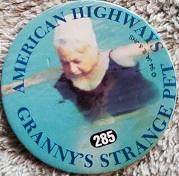|
Having been to music school for jazz, while the movie glosses over the artistic elements of jazz and focuses almost entirely on technique, this wasn't entirely inaccurate based on my own experience. Most teachers felt that the artistic, creative side of improvising would come on its own by focusing on theoretical and technical mastery in combination with studying the jazz greats. The obsession with having perfect time is definitely something I've seen first hand and I've personally had to repeat the same bar for an hour in a particularly frustrating music lesson. Yes, the physical elements are exaggerated in the movie but I think that's because it's easier to depict physical rigorous effort compared to mental or theoretical practice in relation to music. I guess my point is that while the musical elements weren't perfectly realistic (not that they need to be) they were more accurate than most jazz musicians like to admit, at least when compared with my own university's music program.
|
|
|
|
|

|
| # ? Apr 23, 2024 19:26 |
|
cat doter posted:I think one of the things that makes this movie pretty great is that it doesn't offer an easy answer, it'd be easier to say his ambition was ultimately wrong if he failed, but all of the abuse and humiliation he faced lead to him being successful, there's no doubt that the movie leaves things in a place of "he's going somewhere", but I also don't think it was saying that abuse is worth it, because neeman is likely just a broken miserable kid who happens to drum really well and there's something a little horrifying about it I didn't think it took specialized knowledge to realize that hijacking a performance like that isn't necessarily going to be rewarded by the relevant community, but based on responses to this film I guess I was wrong. I haven't read any interviews with the director (and this is CD, so I get to ignore his words anyway!), but from my viewing the film left no doubt that Andrew had no future in jazz, he only had the approval of Fletcher. The two of them are basically destroying their careers together on one of the most respected stages in music. I'm surprised more people don't see it that way. Andrew is a loving horrible person and he reveals himself as such in a very public way when he takes over. It doesn't matter how technically proficient he is, no one is going to want to play with that guy. But then, I am one of the people who spent the movie slightly distracted by how not remotely jazzy this movie was. I don't blame the musicians for being upset by it because you have something that is ultimately about generosity and collaboration being used as a vehicle for this ugly story about self absorbed stinginess. This reviewer captures it well: quote:But for all the emphasis on jazz (and all the swaggering big-band numbers by Justin Hurwitz), Whiplash isn't really a jazz-oriented movie. We've all heard about the legendary after-hours "cutting contests" in which the great players soloed back and forth, trying to smoke each other. But if you've ever played in any kind of improvisational group, you know that the key to making it work is listening to your fellow players, not trying to vanquish them. The jazz musicians I know may be incredibly exacting like Fletcher, but the good ones also understand that generosity and camaraderie are integral to a great ensemble, and that the easiest way to ruin a number is to let it turn into an ego competition, with every player disinterestedly marking time until the spotlight comes to him. http://www.chicagoreader.com/chicago/whiplash-damien-chazelle-jk-simmons-miles-teller-jazz-movies/Content?oid=15492714 Approaching the film from an entirely different angle, here's an interesting piece from Slate that explores the role of homophobia in the film: http://www.slate.com/blogs/outward/2014/10/22/why_does_whiplash_damien_chazelle_s_jazz_movie_contain_so_much_homophobia.html
|
|
|
|
quote:What Whiplash ultimately champions isn't really musicianship but empty, grandstanding virtuosity. Under Fletcher's tutelage, Andrew never learns anything about nuance or dynamics; as designated by Chazelle, the measures of his artistic accomplishment are strictly speed and ferocity. The movie ends with Andrew executing one of those horrible, endless jerk-off solos that give jazz a bad name, though it's presented as the ultimate victory.
|
|
|
|
MoosetheMooche posted:Having been to music school for jazz, while the movie glosses over the artistic elements of jazz and focuses almost entirely on technique, this wasn't entirely inaccurate based on my own experience. Most teachers felt that the artistic, creative side of improvising would come on its own by focusing on theoretical and technical mastery in combination with studying the jazz greats. The obsession with having perfect time is definitely something I've seen first hand and I've personally had to repeat the same bar for an hour in a particularly frustrating music lesson. Yes, the physical elements are exaggerated in the movie but I think that's because it's easier to depict physical rigorous effort compared to mental or theoretical practice in relation to music. I guess my point is that while the musical elements weren't perfectly realistic (not that they need to be) they were more accurate than most jazz musicians like to admit, at least when compared with my own university's music program. It's interesting to hear this from at least once source, thanks.
|
|
|
|
Henchman of Santa posted:No. No. No. No. The message of this film was not complicated and yet so many reviewers missed the point by a mile. It's amazing. I looked at your posts trying to see what you consider the simple point of the film, and I must agree with you that the football trash talk was a funny scene (I thought the character's only likeable moment), but also point out that a New Yorker article that ends in "Buddy loving Rich" is a stand alone delight, whether or not you agree with its interpretation of the film. So what do you think is wrong in that excerpt? Most viewers appear to have walked out of the movie thinking that Andrew's solo performance was impressive. That is the success portion of the "is it worth it?" calculation that seems to be the most popular interpretation of the film. If you accept that style of performance as a success, then the film has successfully championed that style as good and the reviewer is simply explaining why it is not good. Edit: Something that's going to stick with me about this movie is how I spent the entire thing strongly disagreeing with the "the worst words are good job" philosophy but when evaluating Teller's performance I basically apply a similar mindset. I mean, I think the guy had something like three months to learn how to play the drums, and he does a great job given those constraints but I can't help but hold it against him that he looks so loving rigid in his performance and all great drummers are loose. #IAMFLETCHER solovyov fucked around with this message at 20:12 on Mar 7, 2015 |
|
|
|
solovyov posted:I looked at your posts trying to see what you consider the simple point of the film, and I must agree with you that the football trash talk was a funny scene (I thought the character's only likeable moment), but also point out that a New Yorker article that ends in "Buddy loving Rich" is a stand alone delight, whether or not you agree with its interpretation of the film. The guy who wrote the New Yorker article is a dolt, though. Andrew is missing the spirit of jazz because he's focused entirely on the technical mastery. He says it a million times, "I want to be great", and his idea of being great is performing rhythmically unbelievable jazz feats even if he has no feeling and no connection to the music. He hates his teacher and yet at the same time knows that Fletcher has the distinct ability to recognize and cultivate this particular and limited form of greatness. This all comes at the cost of Andrew's integrity, self-respect, imagination, and human decency. I'm sure most humans can empathize with the desire to be great or be remembered for something, so Andrew is a bit tragic in that sense, but the point is that Andrew sells his soul so he can "cum on the drums" (as my brother-in-law would say) and set Guinness world records at the age of 20 and poo poo. He destroys all his irrational, contemplative, sympathetic traits over the course of the film. He literally distances all compassion and feminine influence in his life including his father (who fills the maternal role in the absence of his mother). He becomes this empty shell of militaristic hyper-masculine virtuosity and, consequently, it's supposed to feel Pyrrhic or hollow for the audience. And look at this New Yorker fucker: quote:Andrew Neiman, who’s nineteen and idolizes Buddy Rich. (Buddy Rich? A loud and insensitive technical whiz, a TV personality, not a major jazz inspiration. Seriously, how much of an idiot can one man be? edit; also, it's not so much that viewers think Andrew's performance was impressive (though the narrative implication is there), it's that viewers found the 10-minute scene impressive in terms of tension, character revelation, and audio/visual spectacle, all 'tuned' to absolute perfection by the director. BeanpolePeckerwood fucked around with this message at 20:37 on Mar 7, 2015 |
|
|
|
second-hand smegma posted:Seriously, how much of an idiot can one man be? This is a funny question, because these two quotes are saying the same thing. quote:Andrew is missing the spirit of jazz because he's focused entirely on the technical mastery. He says it a million times, "I want to be great", and his idea of being great is performing rhythmically unbelievable jazz feats even if he has no feeling and no connection to the music. quote:Andrew Neiman, who’s nineteen and idolizes Buddy Rich. (Buddy Rich? A loud and insensitive technical whiz, a TV personality, not a major jazz inspiration. You're not really disagreeing with most of what the New Yorker guy is writing, you just seem to disagree on whether or not the director intended the audience to see that. As far as I can tell, most people didn't see it. They think Andrew kicked rear end as a drummer in that scene. To them, the hollowness of the victory is in the personal cost to achieve that state of professional excellence. But it isn't excellence at all, by the standards of the profession. People who don't care for jazz (aka most people) don't see that, it's all a bunch of self indulgent noise to them.
|
|
|
|
solovyov posted:This is a funny question, because these two quotes are saying the same thing. He did kick rear end as a drummer in that scene, it was the jazz performance equivalent to a CGI summer blockbuster. You don't think the audience got that? I care for jazz as a listener, but I'm not wrapped up in how it's represented to the world, especially with regard to the narrative techniques involved in making a cinematic statement about human psychology, art, or gender. I actually don't agree with the dude from the New Yorker, mainly because he seems to covet the authenticity of jazz culture prestige, but also because he doesn't know how to interpret the film. It is absolutely bonkers to argue that the thematic elements in Whiplash are accidental. Most people don't 'get' jazz, and many reviewers (especially musicians) don't 'get' Whiplash. Not the first time in film history.
|
|
|
|
I don't think people listen to enough jazz that isn't piped over the speakers at Starbucks to be able to differentiate.
|
|
|
|
I liked the movie a lot but I think my favorite part is that it's a perfect barometer for the type of person who listens to jazz to jerk off over their superior musical taste. It's like the people who watch war movies and bitch about tactical realism. Exaggeration done for dramatic effect in a film? Whaaaaaaa?! Now let me tell you about musical plebianism.
|
|
|
|
Magic Hate Ball posted:I don't think people listen to enough jazz that isn't piped over the speakers at Starbucks to be able to differentiate. And yet it seems that most people in this thread can recognize the difference and, even if they're not up to snuff on music theory or jazz history, can notice something bizarre and slightly twisted in the way the camera move's from Paul Reiser's face in that end scene. I actually think the film is clear enough for people to understand it, and I think most people do understand it even if they can't elucidate on why. edit; some of these reviewers on the other hand...
|
|
|
|
second-hand smegma posted:He did kick rear end as a drummer in that scene, it was the jazz performance equivalent to a CGI summer blockbuster. You don't think the audience got that? I think it was more the jazz performance equivalent of a CGI summer bomb. I'm trying to think of a good example. I didn't see RIPD, but that was really bad, wasn't it? I think your comparison is unfair to both jazz and popcorn films. But yes, I do think most of the audience saw it as a blockbuster, which is why they think it represents him having a promising future. I prefer my happy ending, where two monsters just fell down a bottomless pit in a warm embrace. This interpretation thinks Andrew looked like a jackass, not a kick rear end.
|
|
|
|
solovyov posted:I prefer my happy ending, where two monsters just fell down a bottomless pit in a warm embrace.  I mean, really.
|
|
|
|
solovyov posted:I looked at your posts trying to see what you consider the simple point of the film, and I must agree with you that the football trash talk was a funny scene (I thought the character's only likeable moment), but also point out that a New Yorker article that ends in "Buddy loving Rich" is a stand alone delight, whether or not you agree with its interpretation of the film. quote:So what do you think is wrong in that excerpt? Most viewers appear to have walked out of the movie thinking that Andrew's solo performance was impressive. quote:That is the success portion of the "is it worth it?" calculation that seems to be the most popular interpretation of the film. quote:If you accept that style of performance as a success, then the film has successfully championed that style as good and the reviewer is simply explaining why it is not good.
|
|
|
|
solovyov posted:I think it was more the jazz performance equivalent of a CGI summer bomb. I'm trying to think of a good example. Yeah, I can agree with this. I wasn't really trying to imply differently. The performance is impressive as an insane recovery from disaster and a revenge/surmounting of Fletcher (which is ambiguous, too), in comparison with the alternative of him walking off the stage in shame or embarrassment or some other narrative deflation. I didn't say it was comprehensibly good jazz, only that the scene is so good and so well directed that people come away exhilarated. It was basically a ton of bombast in service of catharsis.
|
|
|
|
Henchman of Santa posted:The same point that most people in this topic have figured out, which is that Fletcher is a monster and Andrew succeeded only in appeasing him, sacrificing every other positive thing in his life in order to do it and horrifying his father. quote:And spare me the "whether or not you agree with the interpretation" poo poo. Saying the film is a celebration of Fletcher's methods is a valid interpretation in the same way that calling Walter White or Travis Bickle heroic figures is valid. You're free to see it that way, but it's still stupid. Just as Chazelle can make a good movie that is inaccurate in its representation of jazz, the New Yorker writer can write a good article about jazz that isn't good criticism of the movie. That's what "whether or not you agree" combined with "stand alone delight" means and it's not bullshit at all. All the hostility here to musicians' responses are failing to extend the same courtesy to those musicians that you demand they extend to Chazelle. You don't get it. Their words aren't real movie reviews anymore than Whiplash is supposed to be a documentary about jazz education. The movie is a pretense, repurposed because OMG Someone Cares What I Think As A Jazz Musician. And why shouldn't they use this moment of cultural attention to talk about the things that are most important to them? As for the film as a celebration of Fletcher's methods, the language you quoted (from the Chicago Reader) had nothing to do with that. It was about the style of music being applauded and the critical method (Chazelle's) being used to judge that music. Reading those particular words as an argument that the film is a celebration of Fletcher's abusive methods is actually dumber than calling Walter White a hero. quote:Who said it wasn't? quote:"Seems to be" according to whom? You and the few reviewers that we're all lambasting are the only ones I've seen who interpreted it that way. quote:To reiterate my earlier point, you're free to accept that as success, but it's still stupid to do so. second-hand smegma posted:Yeah, I can agree with this. I wasn't really trying to imply differently. The performance is impressive as an insane recovery from disaster and a revenge/surmounting of Fletcher (which is ambiguous, too), in comparison with the alternative of him walking off the stage in shame or embarrassment or some other narrative deflation. I didn't say it was comprehensibly good jazz, only that the scene is so good and so well directed that people come away exhilarated. I agree that it worked really well as a viewer of the film, its ugliness worked with the story being told. I also sympathize with the jazz people who interpret it (and many viewers' responses) as essentially saying this is what a great jazz performance looks like and are hurt because it's such a poor representation of what they love.
|
|
|
|
solovyov posted:
I don't really have a dog in this fight, since I enjoy both readings, but in the context of a band performance (i.e. an ensemble production) it's absolutely possible for people to recognize that his performance was something special and at the same time go "but I still don't want to play with this guy." The best jazz drummer in the world doesn't mean poo poo if he can't actually play with a band. His performance was meant to be both awe-inspiring and terrifying; he's skilled, the solo is an outpouring of passion, but he's playing in a vacuum while the whole band just sits there in awkward silence. It's a moment of self-destructive genius.
|
|
|
|
Grizzled Patriarch posted:I don't really have a dog in this fight, since I enjoy both readings, but in the context of a band performance (i.e. an ensemble production) it's absolutely possible for people to recognize that his performance was something special and at the same time go "but I still don't want to play with this guy." The best jazz drummer in the world doesn't mean poo poo if he can't actually play with a band. His performance was meant to be both awe-inspiring and terrifying; he's skilled, the solo is an outpouring of passion, but he's playing in a vacuum while the whole band just sits there in awkward silence. It's a moment of self-destructive genius. Thank you!
|
|
|
|
Grizzled Patriarch posted:I don't really have a dog in this fight, since I enjoy both readings, but in the context of a band performance (i.e. an ensemble production) it's absolutely possible for people to recognize that his performance was something special and at the same time go "but I still don't want to play with this guy." The best jazz drummer in the world doesn't mean poo poo if he can't actually play with a band. His performance was meant to be both awe-inspiring and terrifying; he's skilled, the solo is an outpouring of passion, but he's playing in a vacuum while the whole band just sits there in awkward silence. It's a moment of self-destructive genius. That's fair. I guess it boils it down to a philosophical difference -- I associate "genius"-level talent that has no application with MENSA membership, not awe.
|
|
|
|
Death Of The Author and all that, but in an interview in S&S this month the director had some stuff to say. There have been complaints about the nature of jazz that you depict, of it being insufficiently about improvisation? "I lived and breathed and bled jazz for 4 years of my life, so I stand by the depiction of the music....this movie is about that first post of becoming a musician, which is gaining technique." Also, "The word prodigy itself is a misnomer, because you actually look and you find that Mozart's father happened to be the most important music teacher in the world at that moment, and by the time he was four he'd spent more time at a piano than anyone in their thirties." Along with the rest of the interview it really feels like the director looks at Fletcher as a hero, someone who is sacrificing being liked for creating a genius, and honestly thinks the kid who killed himself Just Wasn't Jazz Material. I don't know if that makes me like the film less, but it certainly makes me like the director less.
|
|
|
|
I was in the middle of typing up a post and then decided to make sure I was correct, and it looks like I wasn't. I thought for certain that Sean Casey (the former student who hung himself) was the former student we briefly saw in the humanizing moment earlier, when Fletcher suggested that his daughter could grow up and play piano for him in Studio Band. I read it as the harrowed father not being able to cope with the idea of his little girl going through the same thing he did. Now, I can't even find anyone else mentioning that scene. For some reason I was convinced it was him - I thought he was referred to by name and everything. Does anyone know what part I'm talking about?
|
|
|
|
ALFbrot posted:I was in the middle of typing up a post and then decided to make sure I was correct, and it looks like I wasn't. Yeah, that's right before the performance where he loses the music. But no, I don't think they even say that guy's name.
|
|
|
|
GonSmithe posted:Yeah, that's right before the performance where he loses the music. But no, I don't think they even say that guy's name. Dang, I could've sworn they did. I did only see it on a long plane ride, so forgive my hazy memory.
|
|
|
|
Quad posted:Death Of The Author and all that, but in an interview in S&S this month the director had some stuff to say. Well that changes the tone significantly.
|
|
|
|
That's interesting, because in a different interview I read Chazelle literally said that Neiman likely would end up dead at thirty from a drug overdose, which seems to me would indicate that he thinks fletcher and his ethos are completely destructed.
|
|
|
|
ALFbrot posted:I was in the middle of typing up a post and then decided to make sure I was correct, and it looks like I wasn't. Related to that, is it general consensus that Fletcher lied about the cause of death being a car accident because he feels partly responsible for his former student committing suicide? As though had he mentioned the suicide, it would be an admission of guilt on his part? It seemed kinda strange to me because Casey had obviously gone on to have a successful career of his own for what seemed like a few years after suffering under Fletcher's tutelage.
|
|
|
|
Battle Rockers posted:Related to that, is it general consensus that Fletcher lied about the cause of death being a car accident because he feels partly responsible for his former student committing suicide? As though had he mentioned the suicide, it would be an admission of guilt on his part? It seemed kinda strange to me because Casey had obviously gone on to have a successful career of his own for what seemed like a few years after suffering under Fletcher's tutelage. That's how I took it. With the notorious reputation he must have had for verbal and mental abuse it would be easy to connect to his personally invested student taking his own life after starting him on a destructive and obsessive path, especially seeing how Neiman started changing after going under his tutelage.
|
|
|
|

|
| # ? Apr 23, 2024 19:26 |
|
osietra posted:Jazz sucks. There's no nice way of saying that to irl jazz lovers, but it's a cold objective truth. ^^ this guy^^ is a moron and knows nothing of music. This movie was just awesome front to back and I loved every part of it, except watching JK Simmons clap on 1 and 3 of a double time swing at the beginning of the movie. That part made me laugh/cringe.
|
|
|

















